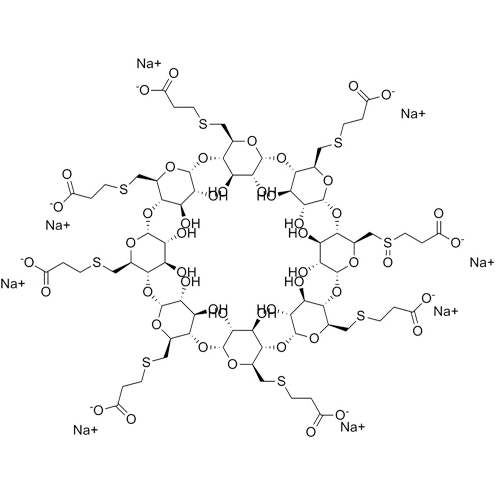What Are the Risks and Benefits of Using Sugammadex During Pregnancy?
Sugammadex(sugammadex sodium) is a neuromuscular blockade reversal agent commonly used in surgical procedures to counteract the effects of muscle relaxants. While its efficacy and safety profile in general populations are well-established, concerns arise when considering its use during pregnancy. This article delves into the risks and benefits associated with the administration of sugammadex in pregnant individuals.

Benefits of Using Sugammadex During Pregnancy
There are several potential benefits to using sugammadex during pregnancy, including:
- Rapid and complete reversal of neuromuscular blockade: Sugammadex is a highly effective and rapid-acting reversal agent for rocuronium and vecuronium, two commonly used NMBAs. This can be important for pregnant women who need to be able to breathe on their own after surgery.
- Improved safety: Sugammadex has a better safety profile than other NMBA reversal agents, such as neostigmine. Neostigmine can cause side effects such as bradycardia, bronchospasm, and nausea, which can be harmful to both the mother and the fetus. Sugammadex has been shown to be safe and well-tolerated in pregnant women, with a low incidence of side effects.
- Reduced risk of residual neuromuscular blockade: Residual neuromuscular blockade is a common side effect of NMBAs that can lead to respiratory problems and other complications. Sugammadex has been shown to reduce the risk of residual neuromuscular blockade, which can improve safety for pregnant women.
In addition to these benefits, sugammadex may also offer some advantages over other NMBA reversal agents in terms of maternal and fetal outcomes. For example, a study published in the journal Anesthesia and Analgesia in 2018 found that sugammadex was associated with a lower risk of postpartum hemorrhage and a higher Apgar score at 5 minutes in neonates.
However, it is important to note that there is limited research on the long-term effects of sugammadex exposure on the fetus. Therefore, it is important to use sugammadex with caution in pregnant women and to weigh the potential risks and benefits before use.

Risks of Using Sugammadex During Pregnancy
There are a few potential risks associated with using sugammadex during pregnancy, including:
- Reduced progesterone levels: Sugammadex can bind to progesterone, a hormone that is essential for the maintenance of pregnancy. This could potentially increase the risk of miscarriage or premature birth. However, it is important to note that there is no clinical evidence to support this concern.
- Allergic reactions: Although rare, allergic reactions can occur with the use of sugammadex. Allergic reactions can range from mild to severe and can be life-threatening.
- Respiratory depression: Sugammadex can cause respiratory depression, especially in patients with underlying respiratory problems. This is why it is important to monitor patients closely after administering sugammadex.
In addition to these risks, there are a few other potential concerns that have been raised about the use of sugammadex during pregnancy, including:
- Reduced placental blood flow: Some studies have suggested that sugammadex may reduce placental blood flow. However, other studies have not found this effect.
- Increased risk of intrauterine growth restriction (IUGR): Some studies have suggested that there may be a link between sugammadex use during pregnancy and IUGR. However, other studies have not found this link.
- Increased risk of neonatal complications: Some studies have suggested that there may be a link between sugammadex use during pregnancy and neonatal complications, such as respiratory distress and low birth weight. However, other studies have not found this link.
More research is needed to fully understand the risks of using sugammadex during pregnancy. However, based on the available evidence, the American Society of Anesthesiologists (ASA) and the Society for Obstetric Anesthesia and Perinatology (SOAP) both recommend the use of sugammadex for the reversal of neuromuscular blockade in pregnant women.

Recommendations for Using Sugammadex During Pregnancy
There are a few recommendations that should be followed to minimize the risk of adverse effects:
- Use the lowest effective dose: Sugammadex is a very potent drug, so it is important to use the lowest effective dose to minimize the risk of side effects.
- Monitor patients closely: Patients should be monitored closely after administering sugammadex to watch for signs of respiratory depression or allergic reaction.
- Use with caution in patients with underlying respiratory problems: Sugammadex should be used with caution in pregnant women with underlying respiratory problems, such as asthma or COPD.
- Consider using sugammadex in cesarean sections: Sugammadex can be used to rapidly and completely reverse neuromuscular blockade in pregnant women undergoing cesarean sections. This can improve safety and reduce the risk of maternal and neonatal complications.
Sugammadex Supplier: Qingmu Pharmaceutical
Qingmu Pharmaceutical is a leading manufacturer of sugammadex in China. The company is committed to providing high-quality and affordable products to its customers. Qingmu Pharmaceutical’s sugammadex products are used in a variety of medical settings, including hospitals, clinics, and surgical centers. Qingmu Pharmaceutical’s sugammadex products have made a significant contribution to Chinese healthcare by improving the safety and outcomes of patients undergoing surgery and other medical procedures.
Qingmu Pharmaceutical is also committed to innovation. The company was the first in China to develop a generic version of sugammadex, which has made this important drug more affordable for patients. Qingmu Pharmaceutical is a valuable asset to the Chinese healthcare system and is committed to improving the health and well-being of the Chinese people.
Conclusion
Sugammadex is a neuromuscular blockade reversal agent that offers a number of potential benefits during pregnancy, including rapid and complete reversal of neuromuscular blockade, improved safety, and reduced risk of residual neuromuscular blockade. However, there are also a few potential risks associated with its use, such as reduced progesterone levels, allergic reactions, and respiratory depression.
Overall, the benefits of using sugammadex during pregnancy outweigh the risks. However, it is important to use sugammadex with caution and to monitor patients closely after administering the drug.
Qingmu Pharmaceutical is a leading supplier of high-quality and low price sugammadex in China. The company’s commitment to innovation has made it a valuable asset to the Chinese healthcare system.








